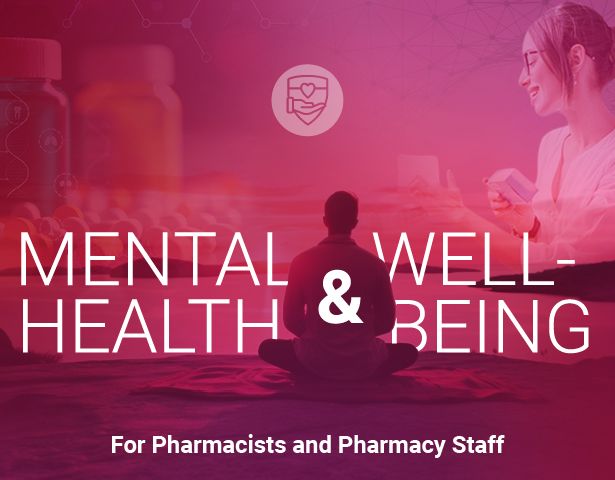Mental Health and Well-Being: For Pharmacy Staff
Understanding the Issue
The recent uptick in resignations among pharmacy staff at all levels and a drop in the enrollment at pharmacy programs and colleges is the beginning of an alarming trend of a shortage of qualified pharmacy personnel at pharmacies that promises to continue. Coupled with a growing list of responsibilities and increased demand and it is no wonder that pharmacists and pharmacy technicians are burning out.

Why Mental Health Matters

These conditions can lead to mistakes that can have potentially life-altering consequences for pharmacy staff and patients. According to data from the Well-being Index for Pharmacy Personnel (WBI), 31% of pharmacists and pharmacy technicians who used the self-assessment tool are at risk of experiencing high distress. And those who risk experiencing high distress also have a twofold risk of making a medication error. Since the WBI was launched in 2019, more than 10,000 pharmacists, pharmacy technicians, and student pharmacists have assessed and reassessed their well-being and stress.
Our Position

We believe that addressing mental health and well-being is a shared responsibility that requires the collective effort of the entire pharmacy community. Working with our member boards of pharmacy and pharmacy associations to promote a healthier pharmacy environment and combat unsafe working conditions, we continue the work of former NABP President Lenora S. Newsome, PD, to create a more resilient and healthier pharmacy workforce.
Stay Informed
To help support pharmacists and pharmacy technicians, we have compiled tools and information that can be used to find help.
Self-Evaluation Tools
- Assess your well-being with the Well-being Index for Pharmacy Personnel. The tool evaluates your fatigue, depression, burnout, anxiety, and stress. Developed by the Mayo Clinic and offered by APhA, the tool is an anonymous, research-validated online tool.
- Submit your workplace experiences – positive and negative – to Pharmacy Workplace and Well-being Reporting (PWWR). This anonymous and confidential reporting tool was developed to help enhance and safeguard the pharmacy workplace. Information collected through the PWWR reports will help to tell a collective story that can lead to change and improvement in well-being and patient safety.

Courses
Mental Health First Aid (MHFA)
Learn to identify, understand, and respond to signs of mental illnesses and substance use disorders. The training gives you the skills you need to reach out and provide initial help and support to someone who may be developing a mental health or substance use problem or experiencing a crisis.
National Alliance on Mental Illness (NAMI) Provider
Health care providers working with individuals affected by mental illness can gain insights about the importance of mental health and treatment models prioritizing collaboration and compassion among clients, families, and providers. Through this 15-hour program, the instructors guide participants by sharing lived experience in combination with an evidence-based curriculum.
Mental Health First Aid in Pharmacy
Improve the understanding of the presentation and pervasiveness of mental illness, challenge myths and misconceptions regarding individuals with mental illness, and share effective engagement strategies. The training will help you to identify mental health disorders as well as individuals with mental illnesses.
Trauma and Healing Courses
Further your understanding and support of trauma in the workforce and enhance healing strategies through courses and certification programs offered by Dr Helen Sairany.
Understanding and Preventing Burnout among Public Health Workers: Guidance for Public Health Leaders
Working in a distressing environment can strain a person’s physical, emotional, and psychological well-being. In this online training, public health supervisors can learn strategies to prioritize employee health and well-being and prevent burnout.
Work and Fatigue Online Training
Learn how fatigue can affect safety, productivity, and judgment. Discover practical tips for preventing burnout and maintaining energy throughout the workday.
Safety Culture in Health Care Settings
Improve your knowledge about work-related hazards and address organizational and personal strategies to promote a safe and healthy work environment.
Patient Resources
Pharmacy Personnel Resources
Mental Health Resource Card
This card provides national resources for mental health assistance that can be shared with pharmacy colleagues. Boards of pharmacy who are interested in creating state-specific resource cards may contact us at marketing@nabp.pharmacy for assistance with creating designs or templates.
Community Pharmacy Education and Resources
This resource page is intended for community, retail, and ambulatory care pharmacists and provides quick links to many resources a pharmacist seeking information on mental health might find valuable.
Resources for Hospital Leaders
The NIOSH Impact Wellbeing page offers hospital resources such as surveys and a toolkit for hospital leadership to help build a system where workers can thrive based on evidence-informed solutions.
Comprehensive Support Guide
For Health Care professionals, NAMI offers a guide addressing the unique challenges of stress, trauma, and emotional responses for health care professionals, providing actionable tips, peer support, confidential mental health services, resilience building, wellness strategies, and family support, all underscored by the crucial message of prioritizing self-care.
Stress First Aid for Health Care Professionals: Recognize and Respond Early to Stress Injuries
This module guides health care professionals in identifying and addressing stress injuries through the Stress Continuum Model and Stress First Aid framework, emphasizing early recognition, safety, and ongoing support for recovery.
Burnout and Moral Injury Framework
The National Framework for Addressing Burnout and Moral Injury in the Health and Public Safety Workforce explores the drivers and process of burnout and moral injury and identifies practical strategies and tools to improve worker and learner well-being in health and public safety settings.
Start Your Recovery
Explore a variety of resources, including recovery plans, therapy, and rehab options, as well as substance misuse information to share with colleagues or patients. Plus, hear the stories of others who have battled substance misuse.
Strategies for Workers and Learners
This resource empowers health care workers and learners to address burnout and moral distress by recognizing signs of distress, seeking help, advocating for change, promoting supportive language, participating in well-being solutions, and accessing resources, including the 988 Suicide & Crisis Lifeline, SAMHSA resources, and organizations like NAMI, AMA, and professional associations offering training and support.
Implementing Solutions 2.0: Building a Sustainable Pharmacy Workforce
“Implementing Solutions Summit 2.0: Building a Sustainable, Healthy Pharmacy Workforce and Workplace,” includes actions in key areas to improve pharmacy workplace conditions and an overall call to action for the profession. The report is the culmination of a recent event convened by APhA, ASHP, and NABP to target the ongoing concerns of workplace conditions, burnout, and mental health.